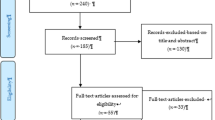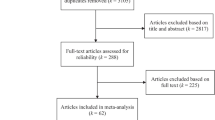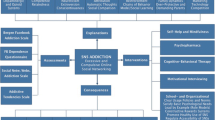Abstract
This article examines Shaffer et al.’s (2020) reaction to a Lancet paper that called for an effective public health approach to gambling. The paper claimed policy responses are individually oriented and inadequately address corporate harm determinants. Shaffer et al. maintain these and related claims are incorrect, misleading and driven by personal, political and anti-gambling views. They contend that their Reno model (RM) of responsible gambling is science-based and ascribes responsibility to multiple stakeholders, not just individuals. While agreeing that the RM is not confined to individuals, multiple reviews indicate that the most widely studied and deployed responsible gambling (RG) measures are individually focussed and have low efficacy (RG-light). An individual emphasis is also identified in the content of Shaffer et al.’s paper and it is suggested that some might see this serving industry interests. While agreeing that people who consider a product to be objectionable may view scientific evidence selectively, it is contended that this probably also applies to people who benefit financially from or are enamoured with a product. Although agreeing with a number of statements made by Shaffer et al., it is concluded that others are not well-grounded in fact. This includes statements about problem gambling prevalence and the relative importance of gambling and other determinants of gambling-related harm. While there are points of tension, it is concluded that the RM and associated RG interventions, especially RG-heavy, can play a significant part within a comprehensive regulatory and public health framework that addresses major harm determinants.
Similar content being viewed by others
References
Abbott, M. (2017a). Gambling and gambling harm in New Zealand: a 28-year case study. International Journal of Mental Health and Addiction, 15(6), 1221–1241. https://doi.org/10.1007/s11469-017-9767-6.
Abbott, M. (2017b). Commentary on Currie et al. (2017): Low-risk gambling limits—a bridge too far? Addiction, 112(11), 2021–2022. https://doi.org/10.1111/add.14017.
Abbott, M. (2017c). Beyond Reno: a critical commentary on Hancock and Smith. International Journal of Mental Health and Addiction, 15(6), 1177–1186. https://doi.org/10.1007/s11469-017-9794-3.
Abbott, M. (2019). Self-directed interventions for gambling disorder. Current Opinion in Psychiatry, 32(4), 307–312. https://doi.org/10.1097/YCO.0000000000000515.
Abbott, M., & Volberg, R. A. (1999). Gambling and problem gambling in the community: an international overview and critique. Wellington: Department of Internal Affairs.
Abbott, M., Romild, U., & Volberg, R. A. (2014). Gambling and problem gambling in Sweden: changes between 1998 and 2009. Journal of Gambling Studies, 30(4), 985–999. https://doi.org/10.1007/s10899-013-9396-3.
Abbott, M., Bellringer, M., Garrett, N., & Mundy-McPherson, S. (2015). New Zealand National Gambling Study: wave 2 (2013). Auckland: Auckland University of Technology, Gambling & Addictions Research Centre.
Abbott, M., Stone, C. A., Billi, R., & Yeung, K. (2016). Gambling and problem gambling in Victoria, Australia: changes over 5 years. Journal of Gambling Studies, 32(1), 47–78. https://doi.org/10.1007/s10899-015-9542-1.
Abbott, M., Binde, P., Clark, L., Hodgins, D. C., Johnson, M. R., Manitowabi, D., ... & Williams, R. J. (2018a). Conceptual framework of harmful gambling. Ontario: Gambling Research Exchange Ontario Gambling Research Exchange Ontario (GREO).
Abbott, M., Bellringer, M., & Garrett, N. (2018b). New Zealand national gambling study: wave 4 (2015). Auckland: Auckland University of Technology, Gambling and Addictions Research Centre.
Abbott, M., Romild, U., & Volberg, R. (2018c). The prevalence, incidence, and gender and age-specific incidence of problem gambling: results of the Swedish longitudinal gambling study (Swelogs). Addiction, 113(4), 699–707. https://doi.org/10.1111/add.14083.
Billi, R., Stone, C. A., Marden, P., & Yeung, K. (2014). The Victorian Gambling Study: a longitudinal study of gambling and health in Victoria, 2008–2012. Melbourne: Victorian Responsible Gambling Foundation.
Binde, P. (2011). What are the most harmful forms of gambling? Analyzing problem gambling prevalence surveys (CEFOS Working Papers). Gothenburg: Centrum för forskning om offentlig sector [Center fpr Public Sector Research (CEFOS).
Binde, P., Romild, U., & Volberg, R. A. (2017). Forms of gambling, gambling involvement and problem gambling: evidence from a Swedish population survey. International Gambling Studies, 17(3), 490–507. https://doi.org/10.1080/14459795.2017.1360928.
Browne, M., Langham, E., Rawat, V., Greer, N., Li, E., Rose, J., et al. (2016). Assessing gambling-related harm in Victoria: a public health perspective. Melbourne: Victorian Responsible Gambling Foundation.
Browne, M., Bellringer, M., Greer, N., Kolandai-Matchett, K., Langham, E., Rockloff, M., et al. (2017a). Measuring the burden of gambling harm in New Zealand. Wellington: Ministry of Health.
Browne, M., Greer, N., Rawat, V., & Rockloff, M. (2017b). A population-level metric for gambling-related harm. International Gambling Studies, 17(2), 163–175. https://doi.org/10.1080/14459795.2017.1304973.
Calado, F., & Griffiths, M. D. (2016). Problem gambling worldwide: an update and systematic review of empirical research (2000–2015). Journal of Behavioral Addictions, 5(4), 592–613. https://doi.org/10.1556/2006.5.2016.073.
Currie, S. R., Hodgins, D. C., Casey, D. M., el-Guebaly, N., Smith, G. J., Williams, R. J., & Schopflocher, D. P. (2017). Deriving low-risk gambling limits from longitudinal data collected in two independent Canadian studies. Addiction, 112(11), 2011–2020. https://doi.org/10.1111/add.13909.
Dowling, N., Smith, D., & Thomas, T. (2005). Electronic gaming machines: are they the ‘crack-cocaine’ of gambling? Addiction, 100(1), 33–45. https://doi.org/10.1111/j.1360-0443.2005.00962.x.
Dowling, N., Youssef, G., Greenwood, C., Merkouris, S., Suomi, A., & Room, R. (2018). The development of empirically derived Australian responsible gambling limits. Melbourne: Victorian Responsible Gambling Fondation.
Drawson, A. S., Tanner, J., Mushquash, C. J., Mushquash, A. R., & Mazmanian, D. (2017). The use of protective behavioural strategies in gambling: a systematic review. International Journal of Mental Health and Addiction, 15(6), 1302–1319. https://doi.org/10.1007/s11469-017-9754-y.
Eadington, W. R. (2003). Measuring costs from permitted gaming: concepts and categories in evaluating gambling's consequences. Journal of Gambling Studies, 19(2), 185–213. https://doi.org/10.1023/A:1023681315907.
el-Guebaly, N., Casey, D. M., Currie, S. R., Hodgins, D. C., Schopflocher, D. P., Smith, G. J., & Williams, R. J. (2015). The leisure, lifestyle, & lifecycle project (LLLP): a longitudinal study of gambling in Alberta. In Final Report for the Alberta Gambling Research Institute. Edmonton: Alberta Gambling Research Institute.
Ferrell, D., & Gold, M. (1998). Casino industry fights an emerging backlash: gambling: leaders mount sophisticated effort to protect interest, as critics say growth is creating more addicts. Los Angeles Times, December, 4, 1998.
Goudriaan, A. E. (2014). Gambling and problem gambling in the Netherlands. Addiction, 109(7), 1066–1074. https://doi.org/10.1111/add.12213.
Griffiths, M. D. (2019). Gambling, problem gambling, and responsible gambling in New Zealand and elsewhere: a brief overview in relation to increasing the number of electronic gaming machines in a casino (pp. 1–43). Report prepared for SkyCity [October 2019].
Hancock, L., & Smith, G. (2017). Replacing the Reno model with a robust public health approach to “responsible gambling”: Hancock and Smith’s response to commentaries on our original Reno model critique. International Journal of Mental Health and Addiction, 15(6), 1209–1220. https://doi.org/10.1007/s11469-017-9836-x.
Henriksson, L. E., & Lipsey, R. G. (1999). Should provinces expand gambling? Canadian Public Policy/Analyse de Politiques, 25(2), 259–275 https://www.jstor.org/stable/3551892.
Horn, B. P. (1997). The courage to be counted. Journal of Gambling Studies, 13(4), 301–307. https://doi.org/10.1023/A:1024963220070.
Latvala, T., Lintonen, T., & Konu, A. (2019). Public health effects of gambling–debate on a conceptual model. BMC Public Health, 19(1), 1077–1093. https://doi.org/10.1186/s12889-019-7391-z.
Livingstone, C., Rintoul, A., de Lacy-Vawdon, C., Borland, R., Dietze, P., Jenkinson, R., ... & Stoove, M. (2019). Identifying effective policy interventions to prevent gambling-related harm. Melbourne: Victorian Responsible Gambling Foundation.
Markham, F., Young, M., & Doran, B. (2014). Gambling expenditure predicts harm: evidence from a venue-level study. Addiction, 109(9), 1509–1516. https://doi.org/10.1111/add.12595.
McGowan, R. (1997). The ethics of gambling research: an agenda for mature analysis. Journal of Gambling Studies, 13(4), 279–289. https://doi.org/10.1023/A:1024907102323.
McMahon, N., Thomson, K., Kaner, E., & Bambra, C. (2019). Effects of prevention and harm reduction interventions on gambling behaviours and gambling related harm: an umbrella review. Addictive Behaviors, 90, 380–388. https://doi.org/10.1016/j.addbeh.2018.11.048.
Meyer, C., Bischof, A., Westram, A., Jeske, C., de Brito, S., Glorius, S., et al. (2015). The “Pathological Gambling and Epidemiology”(PAGE) study program: design and fieldwork. International Journal of Methods in Psychiatric Research, 24(1), 11–31. https://doi.org/10.1002/mpr.1458.
Seabury, C., & Wardle, H. (2014). Gambling behaviour in England and Scotland. Birmingham: Gambling Commission.
Shaffer, H. J. (1997). Gambling research & science: toward a mature relationship. Journal of Gambling Studies, 13(4), 275–278. https://doi.org/10.1023/A:1024934218252.
Shaffer, H. J., Hall, M. N., & Vander Bilt, J. (1999). Estimating the prevalence of disordered gambling behavior in the United States and Canada: a research synthesis. American Journal of Public Health, 89(9), 1369–1376. https://doi.org/10.2105/AJPH.89.9.1369.
Shaffer, H. J., Blaszczynski, A., & Ladouceur, R. (2017). Truth, alternative facts, narrative, and science: what is happening to responsible gambling and gambling disorder? International Journal of Mental Health and Addiction, 15(6), 1197–1202. https://doi.org/10.1007/s11469-017-9779-2.
Shaffer, H. J., Blaszczynski, A., Ladouceur, R., Collins, P., & Fong, D. (Eds.). (2019). Responsible gambling: primary stakeholder perspectives. Oxford: Oxford University Press.
Shaffer, H. J., Blaszczynski, A., & Ladouceur, R. (2020). Gambling control and public health: Let’s be honest. International Journal of Mental Health and Addiction, 1–6. https://doi.org/10.1007/s11469-020-00240-0.
Sulkunen, P., Babor, T. F., Ornberg, J. C., Egerer, M., Hellman, M., Livingstone, C., et al. (2018). Setting limits: gambling, science and public policy. Oxford: Oxford University Press.
Tanner, J., Drawson, A. S., Mushquash, C. J., Mushquash, A. R., & Mazmanian, D. (2017). Harm reduction in gambling: a systematic review of industry strategies. Addiction Research & Theory, 25(6), 485–494. https://doi.org/10.1080/16066359.2017.1310204.
The Lancet. (2017). Problem gambling is a public health concern. Lancet (London, England), 390(10098), 913.
van Schalkwyk, M. C., Cassidy, R., McKee, M., & Petticrew, M. (2019). Gambling control: in support of a public health response to gambling. Lancet (London, England), 393(10182), 1680–1681. https://doi.org/10.1016/S0140-6736(19)30704-4.
Wardle, H., Reith, G., Best, D., McDaid, D., & Platt, S. (2018). Measuring gambling-related harms: a framework for action. Birmingham: Gambling Commission.
Wardle, H., Reith, G., Langham, E., & Rogers, R. D. (2019). Gambling and public health: we need policy action to prevent harm. BMJ, 365, l1807. https://doi.org/10.1136/bmj.l1807.
Williams, R. J., West, B. L., & Simpson, R. I. (2012a). Prevention of problem gambling: a comprehensive review of the evidence and identified best practices. Guelph: Ontario Problem Gambling Research Centre and the Ontario Ministry of Health and Long Term Care.
Williams, R. J., Volberg, R. A., & Stevens, R. M. (2012b). The population prevalence of problem gambling: methodological influences, standardized rates, jurisdictional differences, and worldwide trends. Guelph: Ontario Problem Gambling Research Centre.
Williams, R. J., West, B. L., & Simpson, R. I. (2007). Prevention of problem gambling: a comprehensive review of the evidence. Report prepared for the Ontario Problem Gambling Research Centre. Guelph, Ontario. http://hdl.handle.net/10133/414
Williams, R. J., Hann, R. G., Schopflocher, D. P., West, B. L., McLaughlin, P., White, N., et al. (2015). Quinte longitudinal study of gambling and problem gambling. Guelph: Ontario Problem Gambling Research Centre.
Xouridas, S., Jasny, J., & Becker, T. (2016). An ecological approach to electronic gambling machines and socioeconomic deprivation in Germany. Journal of Gambling Issues, 33, 82–102. https://doi.org/10.4309/jgi.2016.33.6.
Acknowledgements
The author acknowledges Dr. Giulia Lowe for assistance in formatting, proofing and submitting the commentary.
Author information
Authors and Affiliations
Corresponding author
Ethics declarations
Conflict of Interest
The author declares that he has no conflict of interest.
Ethics Approval
Not applicable.
Additional information
Publisher’s Note
Springer Nature remains neutral with regard to jurisdictional claims in published maps and institutional affiliations.
Rights and permissions
About this article
Cite this article
Abbott, M. Gambling Control and Public Health: Let’s Be Really Honest. Int J Ment Health Addiction 18, 825–834 (2020). https://doi.org/10.1007/s11469-020-00266-4
Published:
Issue Date:
DOI: https://doi.org/10.1007/s11469-020-00266-4




